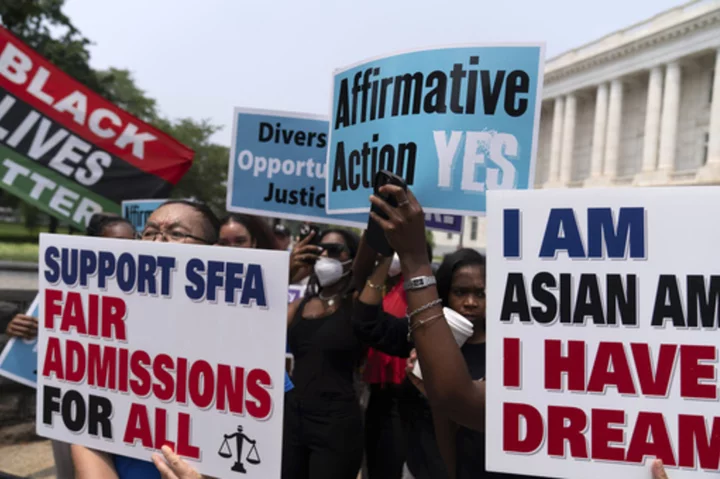WASHINGTON (AP) — A civil rights legal group is challenging legacy admissions at Harvard University, saying the practice discriminates against students of color by giving an unfair boost to the mostly white children of alumni.
It’s the latest effort in a growing push against legacy admissions, the practice of giving admissions priority to the children of alumni. Backlash against the practice has been building in the wake of last week’s Supreme Court’s decision ending affirmative action in college admissions.
Lawyers for Civil Rights, a nonprofit based in Boston, is filing the suit on behalf of Black and Latino community groups in New England, alleging that Harvard’s admissions system violates the Civil Rights Act.
“Why are we rewarding children for privileges and advantages accrued by prior generations?” said Ivan Espinoza-Madrigal, the group's executive director. “Your family’s last name and the size of your bank account are not a measure of merit, and should have no bearing on the college admissions process.”
Opponents say the practice is no longer defensible without affirmative action providing a counterbalance. The court’s ruling said colleges must ignore the race of applicants, activists point out, but schools can still give a boost to the children of alumni and donors.
The new lawsuit draws on Harvard data that came to light amid the affirmative action case that landed before the Supreme Court. The records revealed that 70% of Harvard’s donor-related and legacy applicants are white, and being a legacy student makes an applicant roughly six times more likely to be admitted.
It draws attention to other colleges that have abandoned the practice amid questions about its fairness, including Amherst College and Johns Hopkins University.
The suit alleges that Harvard’s legacy preference has nothing to do with merit, adding that it takes away slots from qualified students of color. It asks the U.S. Education Department to declare the practice illegal. An email seeking comment has been sent to Harvard.
A separate campaign is urging the alumni of 30 prestigious colleges to withhold donations until their schools end legacy admissions. That initiative, led by Ed Mobilizer, also targets Harvard and other Ivy League schools.
President Joe Biden suggested last week that universities should rethink the practice, saying legacy admissions “expand privilege instead of opportunity.”
Several Democrats in Congress demanded an end to the policy in light of the court’s decision, along with Republicans including Sen. Tim Scott of South Carolina, who is vying for the GOP presidential nomination.
It’s unclear exactly which schools provide a legacy boost and how much it helps. In California, where state law requires schools to disclose the practice, the University of Southern California reported that 14% of last year’s admitted students had family ties to alumni or donors. Stanford reported a similar rate.
An Associated Press survey of the nation’s most selective colleges last year found that legacy students in the freshman class ranged from 4% to 23%. At four schools — Notre Dame, USC, Cornell and Dartmouth — legacy students outnumbered Black students.
Supporters of the policy say it builds an alumni community and encourages donations. A 2022 study of an undisclosed college in the Northeast found that legacy students were more likely to make donations, but at a cost to diversity — the vast majority were white.
___
The Associated Press education team receives support from the Carnegie Corporation of New York. The AP is solely responsible for all content.









